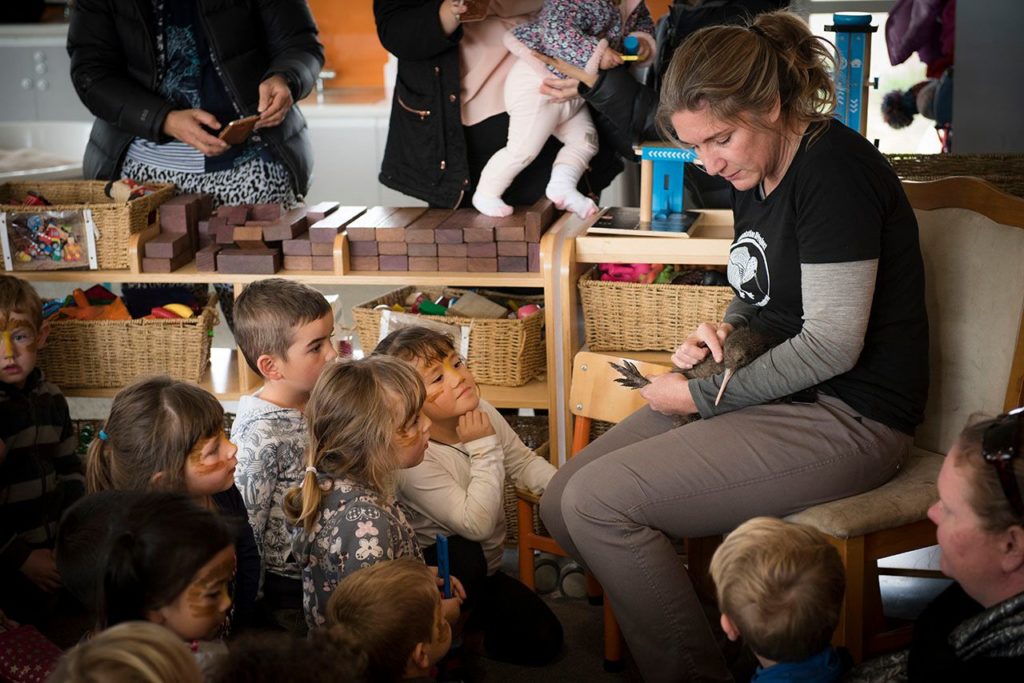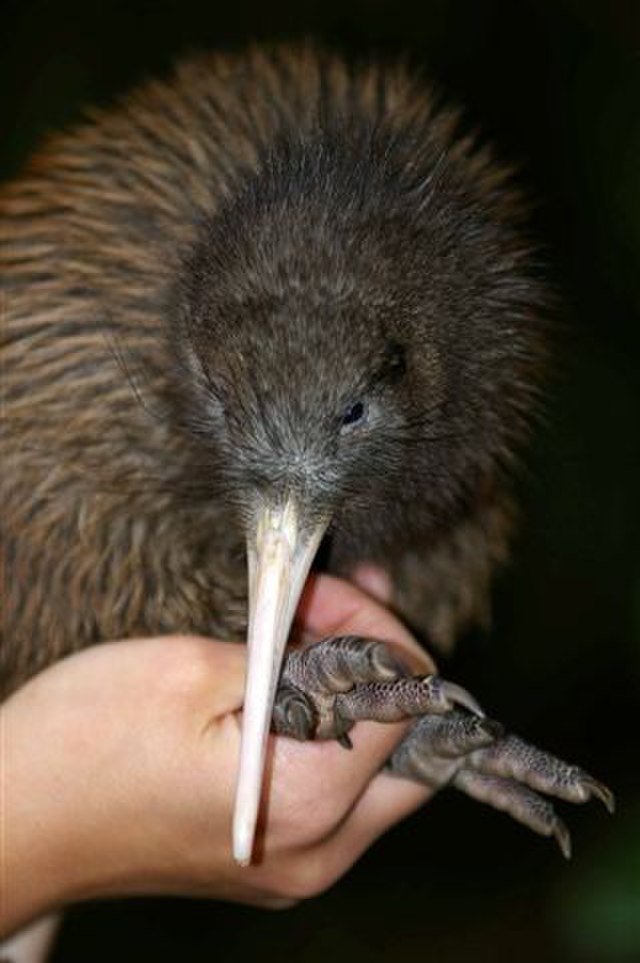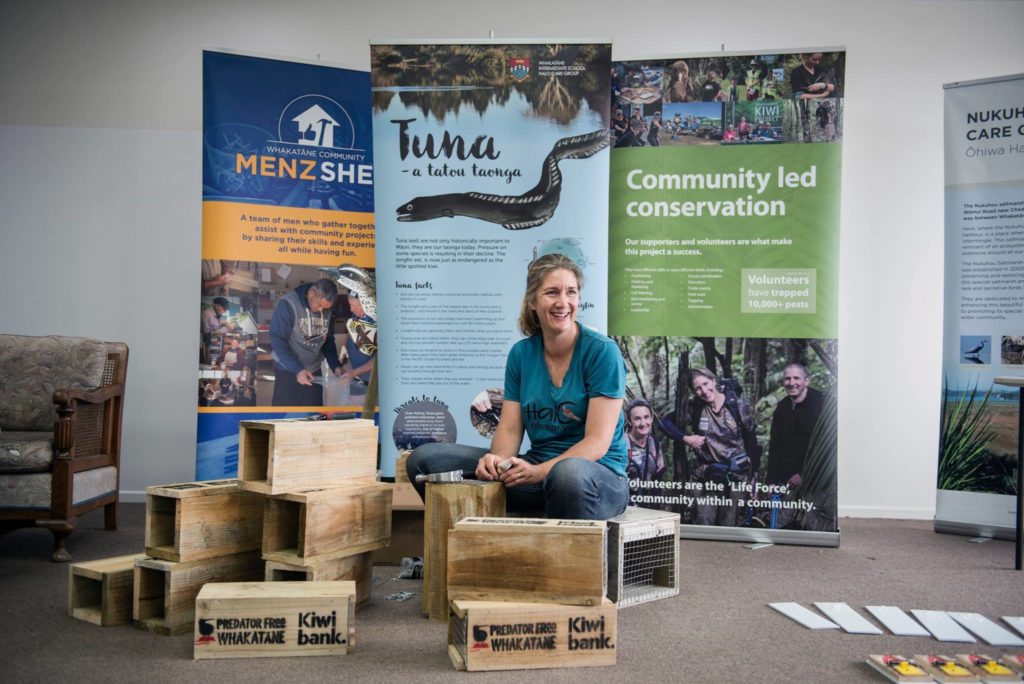‘Whakatāne’s kiwi lady’ Bridget Palmer is dedicated to protecting the environment and saving the North Island brown kiwi. For over 18 years, Bridget was a Conservation Ranger for the Department of Conservation (DOC) working to protect our amazing wildlife and Whakatāne’s reputation as the ‘kiwi capital of the world’.

More recently, Bridget left DOC to focus on supporting community conservation efforts, including coordinating Whākatane’s Halo Project and giving her time to help several local kiwi projects. Bridget manages and trains teams of like-minded people in kiwi handling best practice, taking conservation novices and turning them into experienced kiwi practitioners.
Bridget plays an integral role in inspiring the next generation of conservationists. She runs the Halo project’s Katikati Kadets, a conservation programme that takes local tamariki on a journey where they learn about our native species, first aid training, injured bird rescue, planting and trapping.
What is special about the Whakatāne predator free movement?
We are incredibly lucky that in the ‘heart’ of the Eastern Bay of Plenty that populations of significant keystone species including kiwi, weka, kōkako, falcon, dotterel, bittern, banded rail and North Island robin are still present. Sustained predator control has demonstrated their resilience.
The Whakatāne Kiwi Project is unique because it manages reserves in and around the township and many of these back directly onto residential properties. Effectively this means urban residents have kiwi (and more recently weka) in their backyards and many say they hear both species calling regularly. The Whakatāne Kiwi Project was a success leading a kiwi population that was nearing local extinction to one that is now over 300 and this has kicked off the idea of saving kiwi all around Whakatāne.
In 2008, I had the pleasure of being seconded from DOC to the Whakatāne Kiwi Project Manager role. This was a 3-year secondment and I am still here! I used to say to new volunteers, “When you’re in, you’re in. Once a kiwi has your heart, there is no getting out”. Believe me, the success of this project hasn’t come without many challenges. One of these has been creating landscape predator suppression. ‘Filling the gaps’ between the core project areas to protect the ever-expanding kiwi population and aligning with the government’s vision of Predator Free 2050.
I’ve also been fortunate to be part of HALO Whakatāne which began in 2014 and was formed as a result of a shared vision that the community could expand on successful restoration projects such as the Whakatāne Kiwi Project. HALO Whakatāne inspires people to get involved in conservation and then supports them to take action, whether that is by becoming a backyard trapper, a volunteer for one of our amazing local projects or simply sharing our vision and inspiring others to contribute in any way they can.
While its ultimate measure of success is to have tīeke/saddleback living on the mainland, it will take significant social, lifestyle and attitude changes for this to be achieved. HALO Whakatāne is about helping navigate the pathway to that outcome. I am so excited to be leading this project.

Why did you get involved in conservation?
I was lucky to have been given the opportunities that exposed me to the wonders of nature. Whether that was sailing with my family, staying with one set of grandparents on the farm or spending most afternoons with my other grandparents in the garden or catching bugs and butterflies. Of course, I was one of those kids who pestered the local DOC office for information to help with school projects. In high school, I wanted Paul (Scratch) Jansen’s job, as he was the DOC Ranger I was pestering all those years. I actually got his old Species Ranger job 15 years later and the rest is history. I am now the one that kids and others ask for help with their conservation challenges. I wanted to share the knowledge I have gained throughout my conservation career but never thought I would be that person. I am so humbled that I am.
What benefits have you seen from people getting involved in local conservation projects like Whakatāne Kiwi Trust/Halo Whakatāne?

I love this quote: “In the quiet hours when we are alone and there is nobody to tell us what fine fellows we are, we come sometimes upon a moment in which we wonder, not how much money we are earning, nor how famous we have become, but what good we are doing” – A.A. Milne.
Conservation projects bring a wealth of knowledge from all of those that become part of the team. Having a wider diversity of volunteers creates the ability for people to share their skills and personal expertise. The more connected people feel, the more likely they are to take responsibility for the community and feel pride and a sense of commitment. This is what I have seen and experienced while working and volunteering for the Whakatāne Kiwi Trust and HALO Whakatāne.
How can people support Whakatāne Kiwi Trust/Halo Whakatāne?
HALO Whakatāne has created a wave of backyard trappers that builds on the predator control being undertaken in the reserves around our town. We have a goal to create an unfenced sanctuary within Whakatāne and Ōhope District. We welcome people to contact us to find out how to create their own backyard havens and become part of the trapping network.
There are plenty of volunteer opportunities, but the most valuable is learning about our vision, how we aim to get there and then inspiring others to take action and contribute.
Learn more about Halo Whakatāne on their website and follow their Facebook.

